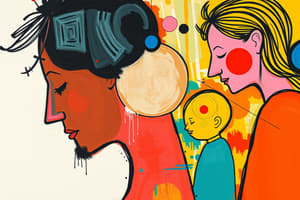Podcast
Questions and Answers
What is stress?
What is stress?
Biological response to demands for change that manifests psychological and/or physiological symptoms
Define stressors.
Define stressors.
Life events or transitions that impact the family unit and produce, or have produced change in the family system
What is coping?
What is coping?
Strategies to minimize or tolerate stress
What are resources in the context of family stress?
What are resources in the context of family stress?
What does 'crisis' refer to in family stress theory?
What does 'crisis' refer to in family stress theory?
What is adaptation in family stress theory?
What is adaptation in family stress theory?
What is ambiguous loss?
What is ambiguous loss?
What is event-based stress?
What is event-based stress?
An individual's family experience of stress, crises, and subsequent adaptation is an __ and __ process.
An individual's family experience of stress, crises, and subsequent adaptation is an __ and __ process.
What does the ABCX model represent?
What does the ABCX model represent?
What are the three factors in the ABCX model?
What are the three factors in the ABCX model?
List the two major factors of the Double ABC-X model.
List the two major factors of the Double ABC-X model.
What does SOC stand for in family stress theory?
What does SOC stand for in family stress theory?
Which of the following describes weak SOC?
Which of the following describes weak SOC?
What is a critical change of events that disrupts an individual's life called?
What is a critical change of events that disrupts an individual's life called?
Flashcards are hidden until you start studying
Study Notes
Family Stress Theory Overview
- Stress: A biological response to demands for change, leading to psychological and physiological symptoms.
- Stressors: Life events or transitions affecting family dynamics, resulting in systemic changes.
- Coping: Strategies employed to minimize or tolerate stress.
- Resources: Traits or characteristics that families can leverage to handle stress.
Crisis and Adaptation
- Crisis: A period of disorganization that disrupts family functioning.
- Adaptation: Adjustments made in response to social or physical stressors.
- Ambiguous loss: Type of loss resulting from physical absence (divorce) or emotional absence (substance abuse).
Stressors and Events
- Types of stressors: Include caregiving demands, demoralizing events like job loss, and transitions in family roles.
- Event-Based Stress: Life-altering events requiring significant social and psychological adjustments.
- Patterns of Family Crisis: Involves an initiating event, disorganization, followed by reorganization.
The ABCX Model
- ABCX Model Components:
- A: Stressor event impacting the family.
- B: Resources available to cope with the stressor.
- C: Family's perception and appraisal of the stressor.
- X: Resulting crisis due to interaction of A, B, and C.
Dual Models of Stress
- Pathogenic Models: Focus on eliminating stress and disease from a homeostatic view.
- Salutogenic Models: Emphasize understanding health as a dynamic process of coping and adaptation.
Family Adaptation
- Family adaptation: Describes the effort to achieve balance post-crisis; important for both individual and family levels.
- Factors Influencing Adaptation:
- Family demands and the accumulation of stressors.
- Access to internal and external resources.
The Double ABCX Model
- Expansion: Considers time and family's ability to manage cumulative stresses, introducing post-crisis variables.
- Key Variables: Stressors, family resources, and processes leading to adaptation outcomes.
Coping Strategies
- Problem Management Strategies: Direct approaches targeting the stressor.
- Emotional Regulation Strategies: Alter perceptions and interpretations of the stressor to reduce emotional burden.
- Meaning-Based Strategies: Foster positive emotions and reframe crises as growth opportunities.
Sense of Coherence (SOC)
- SOC Components:
- Comprehensibility: Perception of stimuli as structured and predictable.
- Manageability: Belief in resources being adequate to meet demands.
- Meaningfulness: Sense that life’s challenges are worthwhile.
Family Dynamics and Culture
- Factors Affecting Family Responses: Previous experiences, cultural factors, and structural contexts shape SOC and coping capabilities.
- Creative Crisis Management: Positive outlook, adaptability, and strong support systems enhance family resilience.
Implications for Practice
- Importance for Nursing: Understanding family adaptation processes crucial for supporting families dealing with chronic illness.
- Future Considerations: Increasing familial stressors necessitate adaptable theoretical models to apply in diverse contexts.
Empirical Evidence
- Research Findings: Studies highlight how supportive relationships and reframing experiences can enhance family functioning amid stressors like chronic illness or crisis.
Applications of Theory
- Theoretical Framework: Provides a lens to assess family dynamics, resilience, and coping in various contexts, including mental health and chronic disease management.
Studying That Suits You
Use AI to generate personalized quizzes and flashcards to suit your learning preferences.




